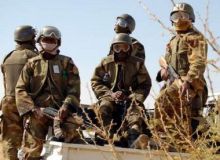Donor fatigue threatens humanitarian aid to Darfur
Nov 16, 2005 (OTASH CAMP, western Sudan) — Adam Youssef fled his Darfur home after an attack by Arab militia, but aid agencies fear they won’t have the cash to feed and shelter him as donors tire of funding a crisis entering its third year.
 More than 2 million Darfuris have been driven from their homes into camps since fighting erupted in Sudan’s remote western region in early 2003, sparking a humanitarian crisis which at its peak claimed 10,000 lives every month.
More than 2 million Darfuris have been driven from their homes into camps since fighting erupted in Sudan’s remote western region in early 2003, sparking a humanitarian crisis which at its peak claimed 10,000 lives every month.
One of the world’s largest aid efforts last year, coordinated by the United Nations and carried out by humanitarian groups, helped bring the crisis under control.
But as the fighting continues and peace talks falter, humanitarian workers say donors are becoming more reluctant to pay for a never-ending emergency and are starting to reduce aid, a development some fear could further destabilize the region.
“I’m very worried this will cause a lot more instability,” said Canada’s special Sudan envoy Mobina Jaffer. “People go hungry so there’s more fighting over less resources.”
Narinder Sharma, a U.N. official in Darfur, said aid agencies were already phasing out their activities and any decrease in funding would spell disaster for millions of people.
“All our work would be undone,” he said. “I just could not bear to see the children go back to that state.”
The United States, which pays for more than half the Darfur aid effort, plans to cut its contribution next year, he added.
FATHER KILLED
Non-Arab rebels took up arms in 2003 accusing the central government of monopolizing power and wealth.
The United Nations says Khartoum then armed mostly Arab militia who forced more than 2 million people from their homes in a widespread campaign of rape, killing and looting. Khartoum denies U.S. charges of genocide.
Youssef said his father was among 43 people killed in the attack on the village of Tama more than two weeks ago. He was killed as he knelt down to say morning prayers at the mosque.
“I managed to run off as soon as I heard the shooting and screaming, but those who couldn’t run away in time were killed.”
Abdel Malik, 15, also fled to the Otash camp outside Nyala town in South Darfur. He pointed to a large scar on his head.
“They smashed me on the head with a big gun,” he said.
Mahjoub Mohamed Adam, also from Tama, said he had received no aid since he arrived at the camp. “I don’t understand why since we’ve been here we’ve had no food or help.”
U.N. and U.S. officials are still optimistic for a peace deal by the end of the year, even though African Union-sponsored negotiations have made little headway amid splits within rebel ranks and spiraling violence on the ground.
Even if the fighting comes to an end, humanitarian workers say there will still be a need for food and other aid to help villagers rebuild their shattered lives.
“We want the peace but we want the money to be able to deal with it too,” said Asaka Nyangara, head of the World Food Program in South Darfur.
Nyangara said rebel divisions hindered aid operations as renegade groups were attacking and even taxing aid convoys.
Despite good relations with leaders of the main rebel Sudan Liberation Army (SLA), 21 WFP convoys were attacked last month, compared to just five in June or July, he said.
As roads become too dangerous to use, aid operations are forced to use expensive air transport. “Darfur is still very much an emergency,” the U.N.’s Sharma said.
(Reuters)
